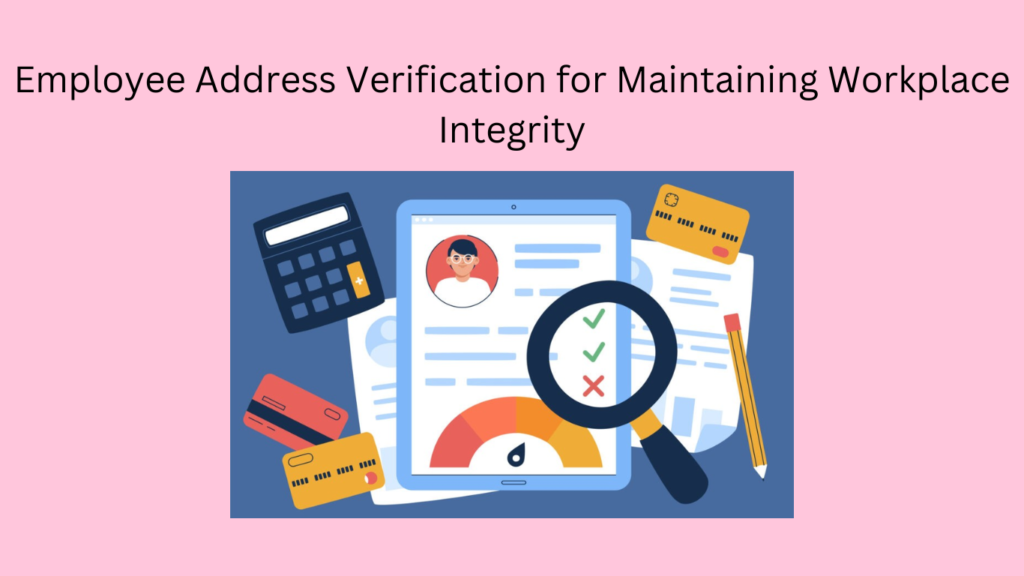Introduction
Maintaining a workplace with high integrity is crucial for the success and reputation of any organization. One important aspect of achieving this integrity is employee address verification. Ensuring that your employees provide accurate information about their residential addresses can help in various ways, from security and safety to compliance and trust-building. In this blog post, we will explore the significance of employee address verification and the methods that organizations can use to implement it effectively.
The Importance of Employee Address Verification
Security and Safety: Address verification plays a pivotal role in enhancing workplace security. By confirming that an employee’s address is accurate, organizations can ensure they have the right contact information in case of emergencies. This is essential for prompt communication during crises, such as natural disasters or security breaches. Accurate addresses also enable organizations to conduct background checks more effectively, reducing the risk of hiring individuals with a criminal history. Additionally, maintaining accurate employee addresses is crucial for employees’ career development, as it ensures that they receive relevant information about opportunities, training, and other professional advancements within the organization.
Compliance: Many industries and organizations are subject to regulations that require accurate employee records, including their addresses. Ensuring compliance with such regulations is not only a legal obligation but also a way to maintain trust with stakeholders, including customers, investors, and government agencies.
Trust-Building: Trust is a key factor in employee-employer relationships. When employees know that their workplace takes address verification seriously, they are more likely to trust the organization’s commitment to their safety and security. This trust can improve overall morale and employee satisfaction.
Methods for Employee Address Verification
Address Confirmation Forms: When onboarding new employees, organizations can ask for proof of address, such as utility bills, government-issued documents, or lease agreements. These documents can be used to verify the accuracy of the address provided by the employee.
Third-Party Verification Services: Employers can enlist the services of third-party companies that specialize in address verification. These companies use various databases and verification methods to confirm the accuracy of an employee’s address.
Periodic Reverification: Employees may change their residences, and their addresses might become outdated. To address this issue, organizations can implement periodic reverification processes to ensure that the addresses on file are still valid. This can be done annually or at a frequency that aligns with organizational needs.
Geolocation Technology: Some organizations use geolocation technology to track and verify the location of employees during work hours. While this may be more suitable for certain industries and job roles, it can be an effective way to ensure that employees are where they claim to be.
Conclusion
Employee address verification is a critical aspect of maintaining workplace integrity. It contributes to the security and safety of employees and the organization as a whole. Additionally, it helps organizations adhere to compliance requirements and fosters trust among employees. By implementing effective methods for address verification, organizations can build a more secure and transparent work environment, which is essential for long-term success and growth.
In conclusion, it’s essential for organizations to take address verification seriously and prioritize the accuracy of employee records. In doing so, they can create a workplace that is not only more secure but also one that builds trust, compliance, and integrity.
FAQs:
Q: Why is employee address verification crucial for businesses?
A: Employee address verification is crucial for maintaining security, safety, compliance, and trust within the workplace.
Q: What documents can be used for address verification during onboarding?
A: Utility bills, government-issued documents, or lease agreements are commonly used for address verification during the onboarding process.
Q: How often should organizations conduct address reverification of employees?
A: The frequency of address reverification can vary, but it’s typically done annually or as needed to ensure address accuracy.
Q: Are there third-party services available for address verification?
A: Yes, third-party verification services specialize in verifying employee addresses using various databases and methods.
Q: Can geolocation technology be used for address verification in all industries?
A: Geolocation technology is more suitable for certain industries and job roles, particularly those where employee location during work hours is critical.
